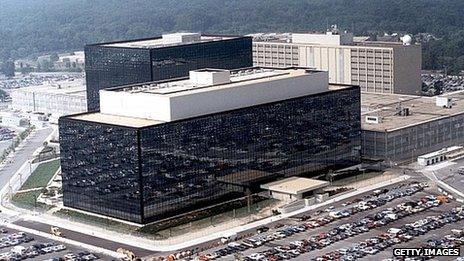Edward Snowden Christmas message: End mass surveillance
- Published
Edward Snowden: ''Asking is cheaper than spying''
Ex-National Security Agency contractor Edward Snowden has delivered an "alternative" UK Christmas message, urging an end to mass surveillance.
The broadcast was carried on Channel 4 as an alternative to the Queen's traditional Christmas message.
Mr Snowden focused on privacy, saying: "A child born today will grow up with no conception of privacy at all."
The 30-year-old has temporary asylum in Russia after leaking details of US electronic surveillance programmes.
'Mission accomplished'
Mr Snowden opened his two-minute message, recorded in Russia, with a reference to novelist George Orwell, author of 1984, saying the surveillance technology described in his works was "nothing compared to what we have today".
He said: "A child born today will grow up with no conception of privacy at all. They'll never know what it means to have a private moment to themselves, an unrecorded, unanalysed thought.
"The conversation occurring today will determine the amount of trust we can place both in the technology that surrounds us and the government that regulates it.
"Together we can find a better balance, end mass surveillance and remind the government that if it really wants to know how we feel, asking is always cheaper than spying."
Channel 4's alternative Christmas message has in the past featured Iran's then-President Mahmoud Ahmedinejad and fictional characters Ali G and Marge Simpson.
Earlier this week, Mr Snowden told the Washington Post, external: "In terms of personal satisfaction, the mission's already accomplished. I already won."
Mr Snowden was granted temporary asylum in Russia on 1 August.
He fled the US in late May, taking a huge cache of secret documents with him. He faces espionage charges in the US.

President Obama is to make a "definitive statement" in January
"I didn't want to change society. I wanted to give society a chance to determine if it should change itself," he told the Post.
"All I wanted was for the public to be able to have a say in how they are governed."
Last week, a federal judge declared the mass collection of telephone data unconstitutional and a presidential advisory panel suggested reforms.
Both the judge and the panel said there was little evidence that any terrorist plot had been thwarted by the programme.
A few days later, in his end-of-year news conference, US President Barack Obama suggested there might be a review of surveillance by the NSA.
In light of "disclosures that have taken place" and public concerns about the programmes, there might be "another way of skinning the cat", he said.
However, he accused Mr Snowden of causing "unnecessary damage" by leaking documents.
President Obama said he would make a "definitive statement" in January about recommendations by the White House panel.